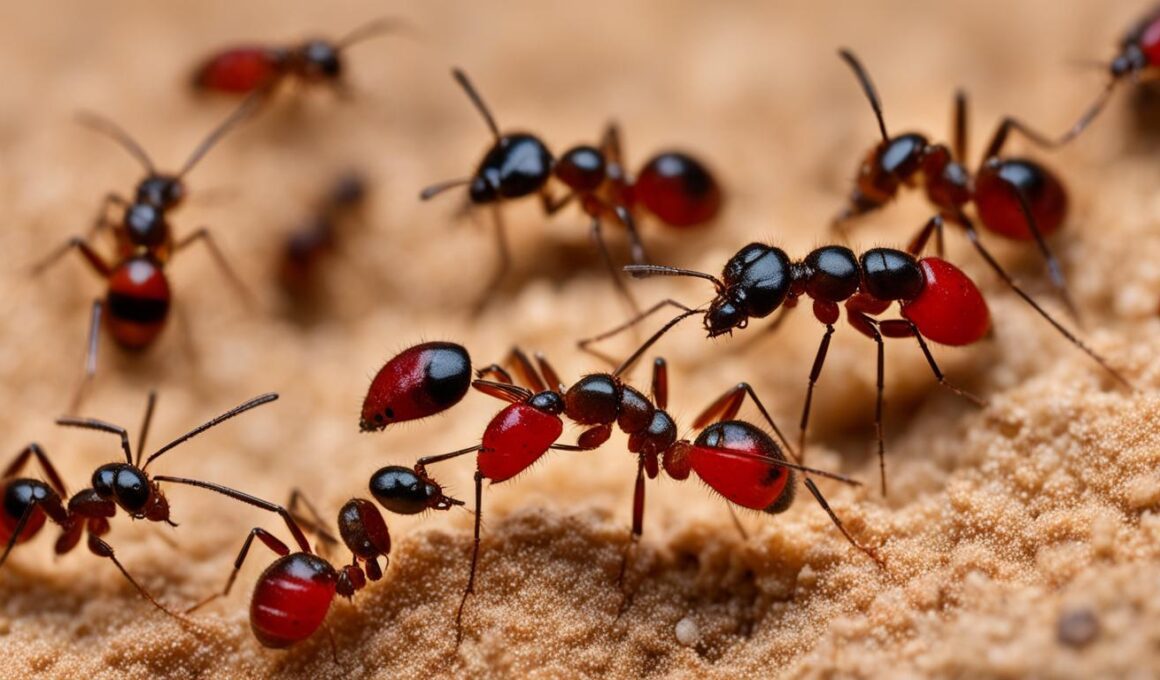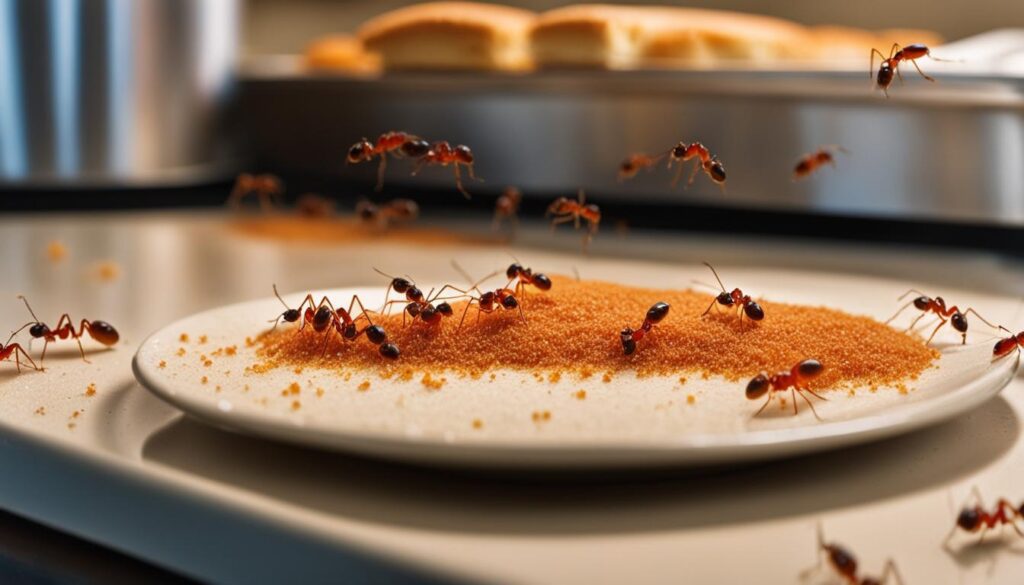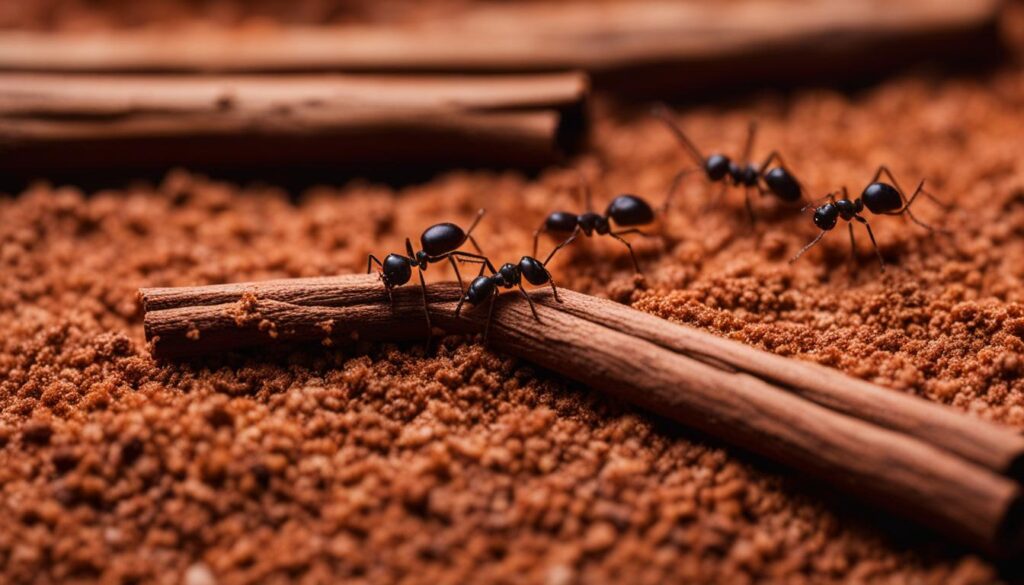If you’ve ever experienced an ant infestation in your home, you know how frustrating it can be to deal with these tiny red ants. These persistent pests can quickly take over your kitchen, pantry, and even outdoor spaces. But fear not, because we’re here to provide you with the best tips to get rid of ants and reclaim your home.
Ants are a common household nuisance, with over 1,000 species found across the country. While carpenter ants and pavement ants are the most common indoor invaders, outdoor ants like fire, Argentine, and harvester ants can also be a problem. Understanding the behavior and preferences of these ants is key to effective pest control.
Key Takeaways:
- Ants are attracted to food, water, and shelter inside your home.
- The most common ants found indoors are carpenter ants and pavement ants.
- Fire, Argentine, and harvester ants are commonly found outdoors.
- Effective ant control involves a multistep process.
- Professional pest control services can help eliminate ant infestations.
What Attracts Ants to My Home?
Ants are pesky invaders in many households, and understanding what attracts them to your home is crucial in effectively dealing with these unwelcome guests. Ants are driven by their basic needs for survival – food, water, and shelter. Let’s explore what exactly attracts ants to your home and how they find their way inside.
Ants Attracted to Food
When it comes to food, ants have a keen sense of smell that allows them to detect even the tiniest crumbs or spills. They are particularly attracted to sweet and sugary substances, making your kitchen and pantry their prime targets. Once an ant finds a food source, it leaves behind a scent trail for other ants to follow, resulting in a trail of marching ants in search of a feast.
Ants Attracted to Moisture
Just like any other living creature, ants need water to survive. They are drawn to sources of moisture in and around your home, such as leaky pipes, dripping faucets, and even condensation on windows. Bathrooms, basements, and kitchens are common areas where ants seek out water, so keeping these areas dry and well-maintained can help prevent ant infestations.
Ants Attracted to Shelter
Ants are resourceful when it comes to finding shelter. They can enter your home through tiny openings and make their nests inside walls, attics, or even under floorboards. Small cracks in weather-stripping or caulk present easy access points for these determined pests. Once they establish a suitable shelter, ants will continue to multiply and infest your home.
By understanding what attracts ants to your home – food, moisture, and shelter – you can take proactive measures to prevent ant infestations. In the next section, we will explore natural remedies and DIY solutions to get rid of ants and reclaim your home.
How to Get Rid of Ants Naturally
When it comes to dealing with ants in your home, natural remedies can be an effective and environmentally-friendly solution. From common household ingredients to natural substances, there are several methods you can try to control ant infestations without resorting to harsh chemicals. Here are some home remedies for ants that you can easily implement:
1. Diatomaceous Earth
If you’re looking for a natural ant control method, diatomaceous earth is a popular choice. This fine powder is made from fossilized remains of marine phytoplankton and has abrasive properties that damage the exoskeleton of ants, causing them to dehydrate and die. To use diatomaceous earth, sprinkle it in areas where ants are present, such as entry points or ant trails. Be sure to choose food-grade diatomaceous earth, as the non-food-grade variety can be harmful if ingested by pets or humans.
2. Detergents
A simple solution of dish soap and water can be an effective homemade ant killer. Mix a few drops of dish soap with water in a spray bottle and spray it directly onto ants or around their entry points. The soap disrupts the ants’ ability to repel water, causing them to suffocate and die. This method is particularly useful for small infestations or for targeting individual ants.
3. Essential Oils
Many essential oils have natural insect-repelling properties and can be used to deter ants. Peppermint oil, for example, is known to be effective against ants due to its strong scent that disrupts their communication and foraging abilities. Simply mix a few drops of peppermint oil with water and spray it around areas prone to ant activity. Other essential oils that can help repel ants include tea tree oil, lemon oil, and cinnamon oil.
4. White Vinegar
White vinegar is a versatile household ingredient that can also be useful for ant control. Mix equal parts of vinegar and water in a spray bottle and apply it to areas where ants are present or along their trails. The strong smell of vinegar disrupts ant pheromone trails, making it difficult for them to navigate and find food sources. Additionally, vinegar can help eliminate any lingering ant scent trails, preventing future ant invasions.
5. Baking Soda or Borax
A mixture of baking soda (or borax) and sugar can act as an effective ant bait. Ants are attracted to the sugar, but the baking soda (or borax) acts as a poison, which they carry back to their nest, ultimately killing the colony. Mix equal parts baking soda (or borax) and sugar, and place small amounts of the mixture near ant trails or in areas where ants are active. Remember to keep this mixture away from children and pets.
6. Chalk
Believe it or not, ants dislike chalk due to the presence of calcium carbonate. Draw lines with chalk around entry points or on surfaces where ants commonly travel. This creates a barrier that ants are reluctant to cross, helping to keep them out of your home.
7. Oranges or Lemons
Ants are repelled by the strong citrus scent of oranges and lemons. Squeeze the juice of these fruits or rub their peels along areas where ants are a problem. You can also place pieces of orange or lemon peel near entry points to deter ants from coming inside.
8. Salt and Boric Acid
A mixture of salt and boric acid can be an effective DIY ant control solution. Mix equal parts of salt and boric acid, and sprinkle it along ant trails or near their nests. The salt dehydrates the ants, while the boric acid acts as a slow-acting poison that they carry back to the nest, eliminating the colony over time. Take precautions to keep this mixture away from children and pets.
Remember, each natural ant control method has its own advantages and limitations. It’s important to choose the method that best suits your needs and preferences. Additionally, it may take time and persistence to achieve effective results, especially with larger ant infestations. If the problem persists or worsens, consider seeking professional pest control services for expert assistance.
How to Get Rid of Ants Outside the House
Gardens are often prone to ant infestations, particularly by red ants, which are a variety of fire ants. To eliminate these pests and prevent them from entering your home, there are several natural ant repellents and control methods you can employ.
- Planting insect repellent plants can help deter ants from your garden. Some effective options include mint, lavender, rosemary, and marigolds. These plants emit scents that ants find unpleasant, making them less likely to establish colonies in your garden.
- Using a mixture of boiling water and soap is another effective way to get rid of ants in your garden. Simply pour the solution directly onto ant nests and ant trails to kill the ants and disrupt their communication pathways.
- Pouring white vinegar near ant-infested areas can also help deter them. The strong smell of vinegar interferes with their ability to detect food sources and disrupts their chemical trail.
- Creating a boric acid and sugar mixture can effectively eliminate ant colonies in your garden. The worker ants are attracted to the sugar, and the boric acid acts as a slow-acting poison, eventually eradicating the entire colony.
- Laying out diatomaceous earth in ant-infested areas is a natural and non-toxic method of ant control. The microscopic sharp edges of diatomaceous earth damage the ants’ exoskeleton, causing them to dehydrate and die.
By applying these outdoor ant control methods, you can effectively eliminate ant infestations in your garden and prevent their entry into your home. Remember to regularly monitor your garden and take proactive measures to prevent future infestations.
How to Prevent Red Ants
To prevent red ants from infesting your home, it’s crucial to take proactive measures. By sealing entryways and creating barriers, you can effectively deter these unwanted pests.
Seal Entryways
To keep red ants out of your home, identify and seal all potential entry points. Inspect your property for cracks, crevices, and gaps in doors, windows, and foundations. Use silicone caulking to seal these openings, preventing ants from finding their way inside.
Create a Barrier
Creating a barrier around your house or garden can help deter red ants from invading your property. Consider using natural substances like coffee grounds, mint or chili pepper plants, or food-grade diatomaceous earth. These substances act as repellents, making the area less appealing to ants.
Maintain Cleanliness
Keeping your sink clean and wiping down surfaces with bleach can help remove enticing food odors that may attract red ants. Additionally, store food in sealed containers to limit access and eliminate potential food sources for ants.
Professional Assistance
If you’ve tried preventive measures but still face a red ant infestation, consider seeking professional pest control services. They have the expertise to effectively eliminate the infestation and provide long-term solutions to keep red ants at bay.
Are the Tips for Dealing with Tiny Red Ants Also Effective for Fire Ants?
When it comes to dealing with red ants vs fire ants, the tips for handling tiny red ants may not be as effective for fire ants. While some methods may overlap, it’s crucial to tailor your approach specifically to the behavior and habits of fire ants to effectively manage and control them.
Conclusion
To effectively get rid of tiny red ants and protect your home from infestation, it is crucial to combine natural remedies and preventive measures. By understanding what attracts ants to your home, using effective ant control tips, and taking proactive actions, you can successfully control and eliminate ant infestations.
First, identify and eliminate factors that attract ants, such as food and moisture. Keep your kitchen and dining areas clean, securely store food in sealed containers, and fix any leaks or sources of excess moisture. By denying ants access to these resources, you can make your home less inviting to them.
Next, use natural ant control methods to deter and eliminate ants. Options include diatomaceous earth, essential oils, vinegar, baking soda, and boric acid. These remedies can be effective in repelling and killing ants without the use of harmful chemicals, making them safe for your family and pets.
Lastly, take preventive measures to create barriers and seal entryways into your home. Use natural ant repellents, such as coffee grounds or mint plants, around the perimeter of your house. Seal cracks and crevices with silicone caulking to prevent ants from finding their way indoors. Additionally, maintain good sanitation practices, such as regularly cleaning your sink and wiping down surfaces with bleach, to discourage ant infestations.
Remember, if the ant infestation persists or becomes overwhelming, it is advisable to seek professional pest control services. Experts can provide targeted treatments and customized solutions to effectively eliminate ants from your home. With the right combination of natural remedies and preventative measures, you can protect your home from tiny red ants and enjoy an ant-free living space.











